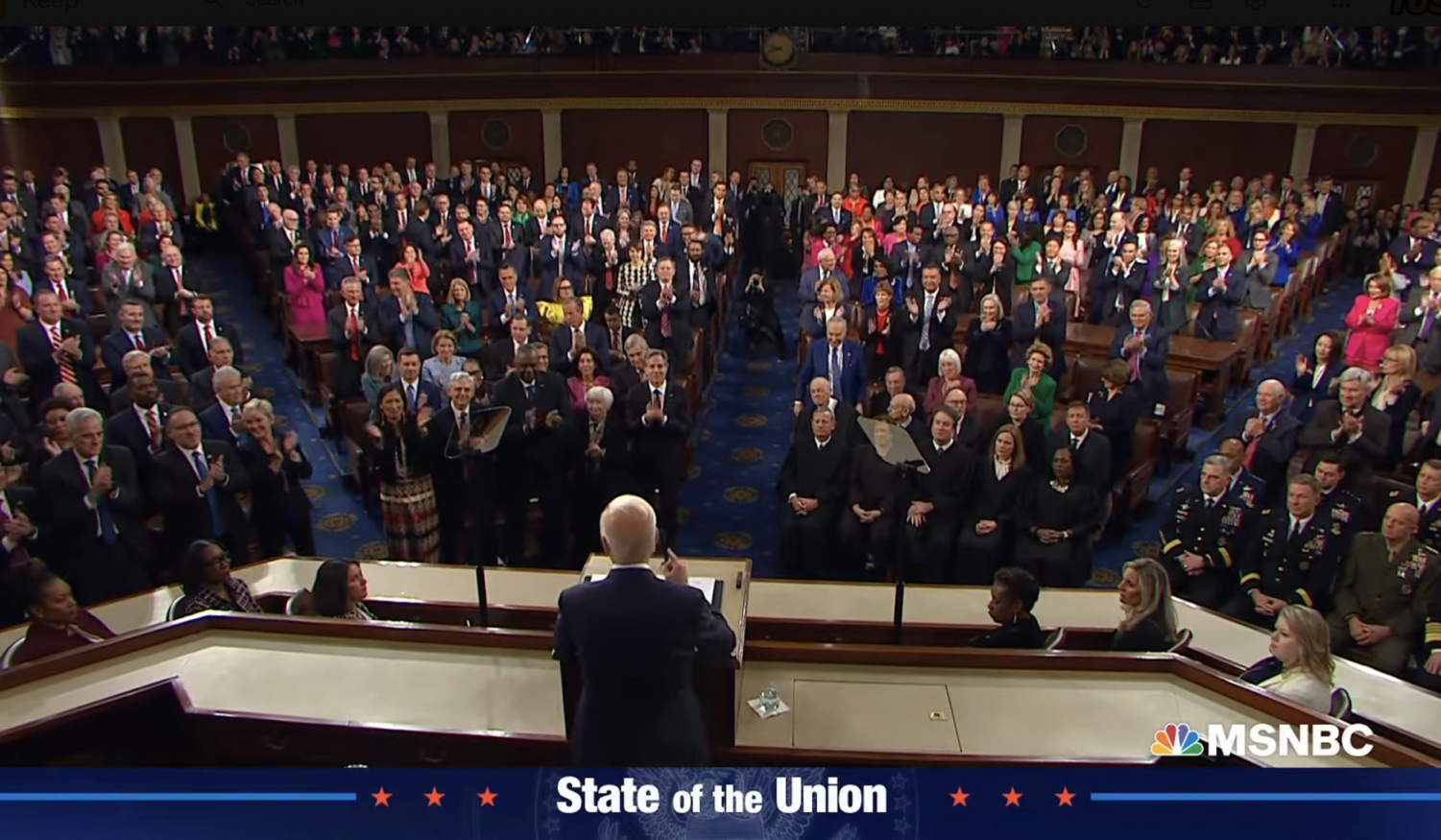Biden Projects Hopeful, Forward-Looking Posture at State of the Union
March 7, 2023
“Let’s finish the job.”
President Biden repeated this slogan at least ten times during his 2023 State of the Union address to a packed House Chamber seating the new 118th Congress. The president enlisted lawmakers to address gun violence and enshrine Social Security and Medicare benefits, while simultaneously touting his administration’s success in curbing inflation and unemployment and passing bipartisan bills targeting infrastructure.
Key Takeaways from the Address:
Broadcasted Tuesday evening on Feb. 7, the president began his speech with congratulatory remarks to the new House Speaker Kevin McCarthy (R-Ca.) and House Minority Leader Hakeem Jeffries (D-N.Y.) while praising former Speaker Nancy Pelosi (D-Ca.) for her decades of public service.
The president then segued into his first point of success, lauding the Bipartisan Infrastructure Law passed in November of 2022 as “the largest investment in infrastructure since President Eisenhower’s Interstate Highway System.” With the law allocating funds to “over 20,000 projects,” the president projected that they will put “thousands of people to work” rebuilding everything from highways and railroads, to bridges and tunnels, to clean water and high-speed Internet all across America. President Biden also conveyed his hopes that the initiative would restore the United States to its preeminent position in modern infrastructure, bemused that “we’ve sunk to 13th in the world.”
Roughly halfway into his prepared remarks, the president engaged in an extemporaneous back-and-forth between a few Republican hecklers concerning the fate of Social Security and Medicare. President Biden, upon claiming that a small contingent of Republican lawmakers — “not even a significant minority” — had proposed plans to sunset Social Security and Medicare as an ostensible remedy to federal budget balancing, was met with jeers by an overwhelming majority of Republicans. The president quipped: “anybody who doubts it, contact my office; I’ll give you a copy of the proposal.” The president was able to broker apparent unanimity, affirming that the proposal was now seemingly “off the books” based on the applause from both sides of the aisle. President Biden, trying to manufacture a bipartisan ethos, appealed to both parties: “I ask my Republican friends to lay down their [fiscal] plan as well. I really mean it. Let’s sit down together and discuss our mutual plans together.”
The president then shifted to a more poignant topic, addressing commonplace gun violence in America. Biden beseeched the chamber that “it’s up to us, to all of us; we all want the same thing: neighborhoods free of violence.” The president then recognized in the gallery the parents of Tyre Nichols, a man brutally beaten by Memphis police who later succumbed to his injuries in January; and Brandon Tsay, the valiant individual who disarmed the Monterey Park gunman responsible for killing 11 people during Lunar New Year celebrations. Commenting on the ubiquity of grief, the president granted that “[he] know[s] most cops . . . are good, decent, honorable people,” but that “what happened to Tyre in Memphis happens too often.” President Biden detailed how most audience members — himself included — never had to give “‘the talk’ that brown and Black parents have had to have with their children” on how to safely interact when pulled over by law enforcement. Addressing heightened calls for police reform, he reasoned, “Let’s do what we know in our hearts we need to do.”
As for gun violence, the president was adamant: “Ban assault weapons now!”
Next, the president addressed the tentative state of abortion after Roe v. Wade was overturned last June, which abrogated 50 years of judicial precedent. Biden took a reproachful stance on the issue, exhorting that “Congress must restore the right that was taken away in Roe v. Wade.” He remarked that abortion should be a constitutional right of women. Underscoring his administration’s efforts to protect access to reproductive healthcare and to buttress patient safety, the president issued a blunt warning, admonishing lawmakers to “make no mistake about it: If Congress passes a national ban, [he] will veto it.”
Lastly, with his remarks coming nearly a year after Russia declared war on Ukraine, the Commander-in-Chief reaffirmed his continued support for the latter, asking the chamber, “Would we stand for the most basic of principles? Would we stand for sovereignty? Would we stand for the right of people to live free of tyranny? Would we stand for the defense of democracy?” Directly addressing the Ukrainian ambassador Oksana Markarova in the gallery, the president pledged that “we’re going to stand with you as long as it takes.”
The president concluded his address by stating that America is at an inflection point, but communicated his optimism about what can be accomplished by “finish[ing] the job.” Issuing his final report, President Biden opined that because the “backbone of this nation is strong, because the people of this nation are strong, the state of the Union is strong.”
Student Reactions to the Address
For politically-active Jacob Usary (11), who followed the State of the Union closely, the verbal sparring between President Biden and the hecklers immediately stood out to him. Providing insight into the impromptu exchange, Usary characterized it as “a power play” made by the president to exert political leverage over Republicans. “I would say it was the Republicans walking into a trap,” Usary observed.
Raphi Rebucas (12), also politically versed, held a more critical view of the exchange, contending that the president’s claim about some Republicans wanting to sunset Social Security “was another political move designed to divide.” Rebucas maintained that “Republicans have always stood strong for seniors” (a major demographic that benefits from these entitlements), surmising that Republicans will deliver on their promises not to slash Social Security.
But Usary begged to differ: despite what appeared to be a moment of bipartisan agreement as the floor stood in applause, Usary identified lawmakers who, on record, express interest in uprooting Social Security, namely, Senators Mike Lee (R-Ut.) and Rick Scott (R-Fl.). According to Usary, opposition to Social Security has had “very deep roots” in the Republican Party platform in reaction to Franklin D. Roosevelt’s 1935 New Deal.
Usary entertained a hypothetical scenario to parallel the position Republicans are in: “let’s say in some possible world, gun control was a very taboo subject, like it was not popular to say you want gun control,” he proposed. Democrats, who privately favor gun control, would publicly champion 2nd Amendment rights, as the opposite would be political suicide. A handful of Democrats might unblushingly support proposals to ban assault weapons, much akin to Lee and Scott’s positions on Social Security. “[So] then if the [hypothetical] Republican president said ‘Okay, you agree with me, let’s stand up for guns as an uncontroversial thing,’ [Democrats are] forced to stand up” since not doing so would draw the public’s ire, Usary articulated. This scenario, he suggested, applies precisely to the bifurcated views Republicans have on Social Security and Medicare.
Aside from the exchange, Usary expressed that he is “hopeful about what can happen [in the future],” mirroring the president’s forward-looking approach, adding that he feels “the political tide isn’t going in a wrong direction.” Conversely, Rebucas strongly objected to President Biden’s purported bipartisan ethos: “the President is so desperate to be seen as . . . someone who can unite the people, when in reality, he’s anything but it,” asserting the president “traffic[ked] in lies and deceptions” by inflating the record on his achievements.
As for the effectiveness of Biden’s talking points, Rebucas evaluated that if the president “continues his divisive governance, there’s absolutely no chance any of his legislation [will] pass the Republican-controlled House and the very slim Democratic majority in the Senate.” Usary countered that “some [legislation] will get through” the Senate, but that the primary purpose of the president’s remarks was a “rhetorical fight” to convince Americans to vote Democrat in 2024 and to attribute any shortcomings to a “Republican-controlled House [that] blocked all of it.” Both possibilities remain to be seen.
Finally, Rebucas and Usary shared similar, if not slightly divergent, views on the Republican Response to the State of the Union Address — time allotted for the opposite party to rebut the president’s claims — delivered by Arkansas governor Sarah Huckabee Sanders.
“I can’t say the Republican response captured the true sentiments of Republicans across the nation,” Rebucas conceded, expressing his disappointment at “how much time [Sanders] spent making personal attacks at the President” instead of addressing kitchen table issues. Rebucas concluded that Sanders used the platform “to contribute to Biden’s flame of divisiveness, as opposed to helping extinguish it.” Indeed, the excessive ad hominem attacks drew sharper criticism from Usary, who typified the rebuttal as “a fear-mongering speech” that employed “recycled Republican talking points:” Big government, high taxes, culture wars, Democrats wanting to control your lives, and the ‘woke’ agenda.
“It’s like conservative bingo,” Usary concluded.

